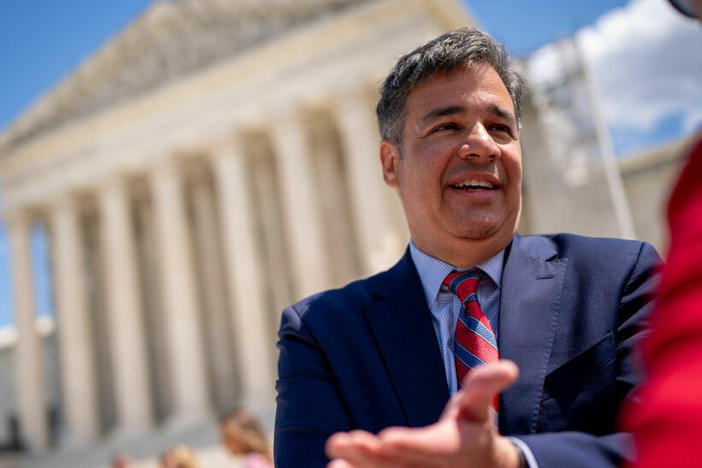Section Branding
Header Content
Articles Linking COVID-19 Vaccines To Death Seem To Be Driving Misinformation Online
Primary Content
Ahead of congressional testimony from the heads of Facebook, Twitter and Google, a new NPR analysis finds that articles linking COVID-19 vaccines to death are driving misinformation online.
Transcript
ARI SHAPIRO, HOST:
Tomorrow, leaders from Facebook, Twitter and Google will testify again before Congress. The subject - rampant disinformation on their platforms, ranging from lies about the 2020 election to the COVID-19 rollout. New reporting from NPR out today shows that a specific type of story about vaccines has been spreading quickly online and may be leading to increased hesitancy.
NPR's Miles Parks is here to explain. Hey there.
MILES PARKS, BYLINE: Hey, Ari.
SHAPIRO: So what is this new data, and what does it show about vaccine misinformation?
PARKS: So we analyzed the types of news stories that have gotten the most engagement on social media this year using data from this media tracking firm called NewsWhip. What we found was basically that the stories specifically about people who have died sometime after being vaccinated went viral at a really high rate. Now, health officials have obviously found no connection between these deaths and the shots they received. But these are stories with headlines that don't say that. They say basically, person gets vaccine, dies two weeks later. And people who were probably already hesitant of vaccines are spreading those articles on social media as if they're evidence. We found Facebook pages with tens of thousands of followers sharing these articles with captions like, quote, "I'll pass on the vaccinations" or, quote, "very concerned about those getting the poke."
SHAPIRO: So this obviously is not showing anything representative or backed by science, but like, just how far out of the mainstream is it? How far are we talking?
PARKS: Yeah. So what's interesting is that, like you said, very few people - very few vaccinated people have actually died, something like 0.0018%, according to the CDC, have died after getting their shot. And that includes elderly people, people who already were suffering from other health conditions. But online, you get a very different picture. The vaccine story with the most engagement so far in 2021 was not about the vaccine rollout or about new trial research. It was about someone who died a couple weeks after getting a shot. One of these stories has ranked near the top in engagement almost every other day this year.
SHAPIRO: And what do we know about the effect that that has on people consuming these stories?
PARKS: So research shows that people generally are pretty bad at assessing risk, but that's especially true after they hear a vivid story. I talked to Deen Freelon, who's a communications professor at the University of North Carolina-Chapel Hill.
DEEN FREELON: This is something that we see, I think repeatedly, with human cognition, the emphasis on the breathless anecdote and then the discounting of statistics.
PARKS: You know, there's just no way that if you're one of these people who either commented, liked or shared one of these articles that connects vaccines to death, that you're going to be more likely to get a vaccine, even though, again, there has been no scientific connection between the two things.
SHAPIRO: But it's interesting that he calls it a breathless anecdote, which is different from an outright lie and, I would imagine, makes it tougher for these big tech companies to deal with.
PARKS: Yeah, absolutely. He basically made the distinction of it's not really disinformation, but it is a fallacy. I also talked to Bret Schafer, who studies online disinformation at the Alliance for Securing Democracy think tank. What he told me is he thinks about it as lying through truth. A recent report he co-authored found actually that Russia has started using this tactic online more and more.
BRET SCHAFER: It's this sort of malinformation and use of selectively cherry-picked truth to create this completely warped sense of reality. And the end effect is essentially the same as a false narrative.
PARKS: Now, executives at Facebook have alluded to this being a problem, but they also say there isn't a clear solution when it comes to policing how people relay true information. Tomorrow, the leaders of Facebook and Twitter are testifying in front of Congress, and it'll be interesting to see whether this trend, you know, gets asked of them about, you know, how are they going to respond.
SHAPIRO: That is some original reporting there from NPR's Miles Parks.
Thank you so much for your insight.
PARKS: Thanks, Ari. Transcript provided by NPR, Copyright NPR.
Bottom Content


